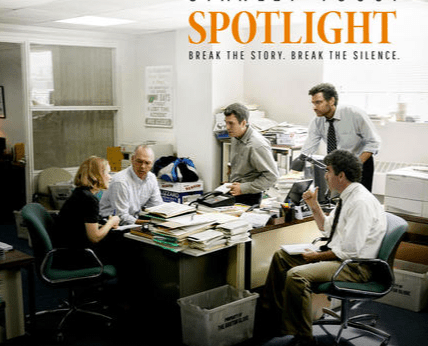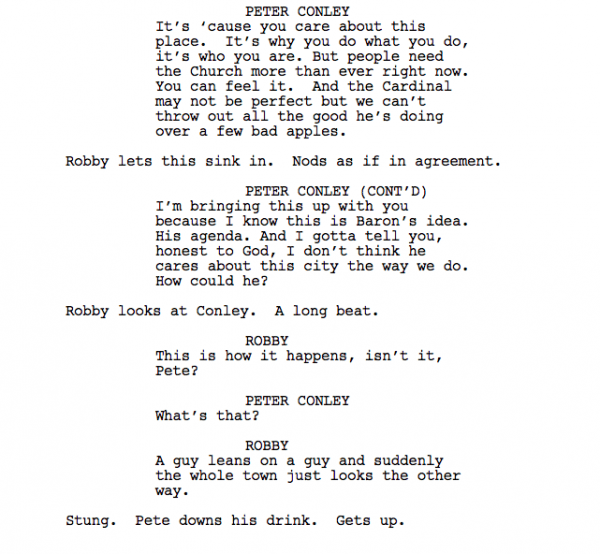Spotlight On Us

I’m not sure why, but I watched for a second time the Academy Award-winning film Spotlight, about how the Boston Globe broke the priest sex abuse story wide open in 2002. It was even better than I remembered it. One aspect of the movie stood out in sharp relief: the way so very many people in Boston knew for years that there was something horrible going on with priests and children in the Archdiocese, but engaged in a conspiracy of silence. It wasn’t that they knew details; it’s that they didn’t want to know details. They wanted to look away because facing the truth was too difficult.
In particular, I noticed how even some reporters and editors at the Globe had to face the fact that they had solid reasons to suspect that something like this was going on, but they didn’t want to dig into it. In one of the final scenes, then-Globe projects editor Ben Bradlee, Jr. (John Slattery), who oversaw the Spotlight investigative team, has an exchange with team editor Walter Robinson (Michael Keaton), who doesn’t want to let them feel too good about themselves. They too should have been on this case much earlier, Robinson says — and recognizes that he played an inadvertent role in refusing to see what was more or less right in front of their noses.
Watching the dramatized version of the Globe team going after this story brought back a lot of memories. Those names again — Margaret Gallant, Ronald Paquin, Richard Sipe, and others — as well as the shock of discovery, the pain of talking to victims, and the bitterness of feeling a door close within oneself (grieving reporter Michael Rezendes, played by Mark Ruffalo, tells a colleague that he had always had hope that he would go back to church, but now that’s gone). But that was another country.
What I can’t get out of my mind now is thinking about all the women who have been sexually abused and assaulted by men who got away with it. Take Harvey Weinstein, for instance. Everybody in Hollywood knew what he was doing, or if they didn’t know specifically, they certainly had reason to know he was a lecherous bully. Nobody cared. To tell the truth about Harvey Weinstein would have brought down their world on their head, same as those victims in Boston. It was an informal conspiracy of silence.
There are many, many more Harvey Weinsteins. Why aren’t the women they abused (and in some cases the men) speaking out? That’s a fair question, but in most cases it’s not that hard to answer. The answer to that question is another question: What are the rest of us doing to make it easier for them to speak out?
I don’t know about you, but I find that I’ve had it up to here with everything. All of it. The lying we do, including lying to ourselves. The b.s. that so many of us otherwise decent people feel compelled to tolerate and defend. This about sums it up:
Seriously. We have Clinton criticizing Trump and Moore without mentioning Bill, Trump criticizing Franken without mention own accusers, some feminists defending Franken, Christian leaders defending Moore… damn.
— Brandon Darby (@brandondarby) November 18, 2017
https://platform.twitter.com/widgets.js
Why do we do this? How can we stand the cowardice within ourselves?
Here, from a scene late in Spotlight, is a partial answer. In this scene, Walter “Robby” Robinson is having a drink with a fictional character named Peter Conley, a Catholic businessman who is very well connected to the Archdiocese. He’s requested this meeting with Robby to dissuade him from publishing the stories. Conley begins by flattering Robby, a Boston native who went to Boston Catholic High, and is part of the Catholic good ol’ boy network. Conley tells him that he’s got a lot of respect in the city. “Baron” is Marty Baron, the new Globe editor-in-chief, and an outsider:

That is how it happens in a lot of cases, in all walks of life, not just the church. You know it as well as I do.
In the spring of 2002, I spoke to a woman in a small Western diocese who worked for the church in a low-level job. A church secretary or something like it. She told me in detail some disgusting things she had seen with her own eyes, evidence of sacrilegious sexual acts I can hardly bear to think about. She told me how she had gone to the bishop with her information about the priest who did these things, and got a phone call the next day from the priest, mocking her. He told her that he knew what she had done, but that she couldn’t touch him, because he (the dirty priest) had the bishop sexually compromised.
That priest went on to abuse children. She gave me his name, and I tracked him down. I found he was at that time in prison in a nearby state doing time for child molestation. (I seem to recall that he died in prison a few years back, but I might be confusing him with someone else.) The bishop by then had gone on to much bigger things, and was leading a large diocese, from which he eventually retired.
The reason she contacted me was because that bishop, in his then-current assignment, was, like many US bishops at the time, embroiled in a scandal involving reassigning molester priests. Somehow she came across my name and e-mail address online, and reached out to me.
I begged the woman to go on the record, to tell the things she knew.
She thought about it hard, for days, because her conscience was eating her alive. But in the end, she couldn’t bring herself to take that step.
“My husband left me and the kids,” she told me. “I’m a single mom. I can’t afford to lose my job with the church.”
If she ratted out the bishop, she would almost certainly lose her job, and she feared that everybody she knew would turn on her. She did not live in a big town. Her concerns were well grounded. I never wrote the story.
I had a fair number of sources who made the same call, but none that stayed with me like that poor tormented woman. Tonight I’m wondering how many children might have been protected had that woman felt safe to tell what she knew.
That was 15 years ago. But the sexual abuse of the weak by the powerful is always with us, in politics, in entertainment, all over. You think it was just the Catholic Church? Wake up. Tonight, in our time and in our places, I’m wondering how many raped or otherwise sexually abused women (and men) would be helped, and how many others would be spared future attack, if those victims felt that they would be defended and supported if they came forward and told the truth.
Tonight I’m wondering why so many of us are such a bunch of moral mediocrities who are prepared to lie and look the other way to protect our sense of order.
Yesterday I read that Alabama Gov. Kay Ivey, a Republican, says that she has no reason to disbelieve the women who accuse Senate candidate Roy Moore of attacking them sexually when they were young teenagers, but that she is going to vote for Moore anyway because
“We need to have a Republican in the United States Senate to vote on things like Supreme Court justices, other appointments that the Senate has to confirm and make major decisions.”
People need the Republican Party more than ever now. You can feel it, can’t you, Robby?

Subscribe for as little as $5/mo to start commenting on Rod’s blog.